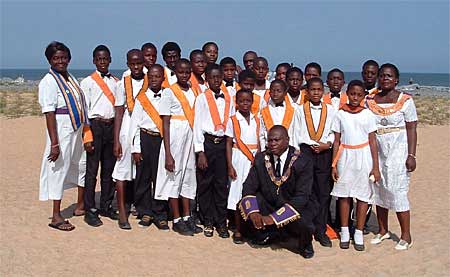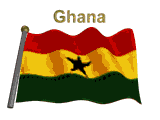Orangeism was set up 81 years ago in
Ghana, formerly the British Gold Coast. The first warrant went to the
Pride of Keta lodge.
However, it was not until the Institution
spread to the Accra region in 1963 and Anloga a year later that it operated
on a country-wide basis.
Lodges were formed in Tema and Ho in
1977, Anyako in 1978, Agbozume in 1979, Peki in 1980, Ada in 1981, Dzodze
in 1982, Kpando in 1985, and Dzelukope near Keta in 1988.
Most of these areas boast of two lodges
and the Grand Lodge of Ghana now has 25 working warrants.
The Ghanian lodges are strongly aligned
to the Protestant churches in the country, particularly the Anglican community.
Church parades by lodges in the various
centres are commonplace.

Youth members of the Orange
Order in Ghana pictured with their adult helpers at Keta. In front is
the Grand Superintendent of Juniors of the Grand Lodge of Ghana, Togbi
Subo II, who is also a chief of the Anlo Traditional area. “Pride
of Keta” was the first Orange lodge to be founded in Ghana, in the
early twentieth century.
The Orange Order is still
going strong in west Africa in spite of facing many economic and political
barriers, according to research conducted by a University of Ulster academic.
Dr Rachel Naylor, a lecturer in sociology
at the Magee campus, says that the level of interest and commitment to
the Orange Order in parts of Ghana and Togo might come as a surprise to
people living in Northern Ireland.
“Although numerically small, those
involved are highly committed and the level of interest is certainly significant,”
she adds.
There are currently about 20 Orange
lodges in west Africa and membership at a number of youth lodges in Ghana
is increasing, which seems to augur well for the future of the Order in
that area. The revival in Orangeism has coincided with the return of democracy
to Ghana.
There were hopes that a similar environment
for growth might exist in Togo following recent elections but the results
of the poll led to violence and the exodus of thousands of refugees to
neighbouring states.
Dr Naylor’s research into the
nature and significance of the Orange Order in west Africa is supported
by the Institute of Ulster Scots Studies.
She says that whilst there are several
theories put forward as to why the Orange Order managed to gain a foothold
initially in Nigeria and then in Togo and Ghana, none is yet proven. As
a result of ongoing political instability in Togo, most of her research
to date has been concentrated on Ghana.
While several African members have
participated in the July Twelfth celebrations in Northern Ireland - and
this would be an aspiration for others - the majority of the Ghana lodges
mark the Battle of the Boyne with a traditional church service and parade
in their own area.
Like their counterparts in Northern
Ireland, male lodge members in Ghana wear suits and collarettes and march
behind their lodge’s banner. Orangewomen wear their collarettes atop
white dresses.
However, although they march and dress
in much the same fashion as the Northern Ireland brethren, it is nonetheless
difficult to make comparisons, says Dr Naylor, as the political, ethnic
and religious context is so different.
“The current emphasis in Ghana
is very much on the spiritual and social support elements of the Order.”
The Nigerian lodges died out in the
1960s. Economic crisis coupled with a lack of democracy have taken their
toll on the membership level of organisations in both Ghana and Togo.
The upsurge in the popularity of charismatic churches and the fall in
numbers attending “orthodox” Protestant churches in Ghana have
also had a knock-on effect.
As a result, membership levels seem to have fallen off since the Orange
Orders in both Ghana and Togo attained independent Grand Lodge status
in 1985, although the Ghana lodges are now making a comeback.
The wider sociological issues raised
by this study will form an element of a new sociology module to be launched
in the new academic year, Africa in Transition. According to Dr Naylor,
who will be delivering the module, there is currently a high level of
interest in sub-Saharan Africa among academics, development agencies and
politicians and so this is particularly timely.
Dr Naylor first visited West Africa
as a Cambridge undergraduate and these early visits sparked an abiding
interest in the continent. She is an active member of the African Studies
Association of Ireland and organised their recent conference at Magee.

An
insight to the Orange Lodge in Ghana
In the latest tale in UTV's A
Day in the Life series, senior Orangeman Drew Nelson travels to the African
bush to meet with members of the organisation in Ghana.
|



![]()